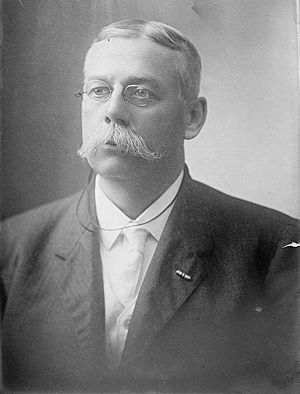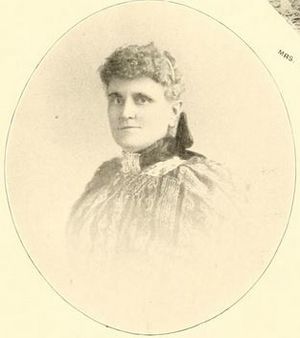Francis E. Warren facts for kids
Quick facts for kids
Francis E. Warren
|
|
|---|---|

Warren in 1919
|
|
| 26th Dean of the United States Senate | |
| In office November 9, 1924 – November 24, 1929 |
|
| Preceded by | Henry Cabot Lodge |
| Succeeded by | Furnifold McLendel Simmons |
| United States Senator from Wyoming |
|
| In office November 24, 1890 – March 3, 1893 |
|
| Preceded by | Office established |
| Succeeded by | Clarence D. Clark |
| In office March 4, 1895 – November 24, 1929 |
|
| Preceded by | Joseph M. Carey |
| Succeeded by | Patrick J. Sullivan |
| 1st Governor of Wyoming | |
| In office October 11, 1890 - November 24, 1890 |
|
| Preceded by | Himself (as Territorial Governor) |
| Succeeded by | Amos W. Barber |
| 6th & 10th Governor of Wyoming Territory | |
| In office April 9, 1889 – October 11, 1890 |
|
| Appointed by | Benjamin Harrison |
| Preceded by | Thomas Moonlight |
| Succeeded by | Office abolished |
| In office February 28, 1885 – November 11, 1886 |
|
| Appointed by | Chester Arthur |
| Preceded by | Elliot S. N. Morgan |
| Succeeded by | George W. Baxter |
| Personal details | |
| Born |
Francis Emroy Warren
June 20, 1844 Hinsdale, Massachusetts, U.S. |
| Died | November 24, 1929 (aged 85) Washington, D.C., U.S. |
| Political party | Republican |
| Spouses |
Helen M. Smith
(m. 1871; died 1902)Clara LeNaron Morgan
(m. 1911) |
| Profession | Politician, farmer |
| Awards | Medal of Honor |
| Signature | |
| Military service | |
| Allegiance | Union |
| Branch/service | |
| Rank | |
| Unit | |
| Battles/wars | American Civil War |
Francis Emroy Warren (born June 20, 1844, died November 24, 1929) was an important American politician. He was a member of the Republican Party. He is best known for serving many years in the United States Senate for Wyoming. He was also the very first Governor of Wyoming. Warren was a brave soldier in the Union Army during the American Civil War. He was the last soldier from that war to serve in the U.S. Senate.
Contents
Early Life and Brave Military Service
Francis Warren was born on June 20, 1844. His hometown was Hinsdale, in Massachusetts. He went to local schools and an academy there.
A Hero in the Civil War
During the American Civil War, Warren joined the Union Army. He served in the 49th Massachusetts Infantry. When he was just nineteen, he showed great courage during the siege of Port Hudson. His unit faced a very strong attack. Warren was injured but managed to stop the enemy's cannons. For his bravery, he received the Medal of Honor. Later, he became a captain in the Massachusetts Militia.
Family Life
Francis E. Warren married Helen Smith from Massachusetts. They lived most of their married life in Wyoming. They had two children: a daughter named Helen Frances and a son named Frederick Emory. Mrs. Warren was very active in her community. She led church groups, literary clubs, and charitable organizations in Cheyenne. She also helped with a hospital for children.
From Rancher to Political Leader
After the Civil War, Warren worked in farming and raising animals in Massachusetts. In 1868, he moved to Wyoming. At that time, Wyoming was part of the Territory of Dakota. He settled in Cheyenne.
Building Businesses and Serving the Community
In Cheyenne, Warren became a successful businessman. He worked in real estate, ran stores, and raised livestock. He even helped set up Cheyenne's first lighting system. These efforts made him quite successful.
Early Political Roles
Warren also started a career in politics. He was a member of the Wyoming Territorial Senate from 1873 to 1874 and again from 1884 to 1885. During his time, he served as the president of the Senate. He was also on the Cheyenne City Council and served as the treasurer of Wyoming several times. In 1885, he became the Mayor of Cheyenne.
Becoming Governor of Wyoming
In February 1885, President Chester A. Arthur chose Warren to be the Governor of the Territory of Wyoming. He served until November 1886. Later, President Benjamin Harrison appointed him governor again in April 1889. He continued in this role until 1890. On October 11, 1890, he was elected as the very first Governor of Wyoming after it became a state. He served until November 24, 1890.
A Long Career in the U.S. Senate
In November 1890, Francis Warren was elected to the United States Senate. He resigned as governor to take this new role. He served as a Republican Senator until March 4, 1893. After a short break to focus on his businesses, he returned to the Senate on March 4, 1895. He continued to serve there until his death on November 24, 1929.
Important Senate Roles
During his many years in the Senate, Warren led several important committees. These committees focused on topics like:
- Irrigation and making dry lands useful
- Military matters
- Public buildings and grounds
- Agriculture and forests
- Government spending
His Passing
Francis E. Warren passed away on November 24, 1929, in Washington, D.C.. His funeral was held in the U.S. Senate chamber. When he died, he had served more years in the Senate than anyone else before him.
Lasting Legacy
Francis E. Warren left a significant mark on Wyoming and the nation.
Honoring His Name
The F. E. Warren Air Force Base in Cheyenne, Wyoming, is named in his honor. This shows how important he was to the state.
Family Connections and Historical Moments
Warren's daughter married John J. Pershing in 1905. Pershing later became a famous general. President Theodore Roosevelt promoted Pershing to a high rank. Sadly, Pershing later lost his wife and three daughters in a tragic fire.
Contributions to the Nation
Warren was a forward-thinking leader. He was the first senator to hire a female staff member. During World War I, as the head of the appropriations committee, he helped fund America's war efforts. In March 1915, Warren and his second wife, Clara LaBarron Morgan, bought the Nagle Mansion, now known as the Nagle Warren Mansion, from Thomas Cosgriff. Important guests, including Presidents Theodore Roosevelt and William Howard Taft, visited their home. This mansion is now a historic landmark. In 1958, he was recognized in the Hall of Great Westerners.
See also
- List of Medal of Honor recipients
- List of American Civil War Medal of Honor recipients: T–Z
- National Irrigation Congress
- List of members of the United States Congress who died in office (1900–1949)
 | Audre Lorde |
 | John Berry Meachum |
 | Ferdinand Lee Barnett |


